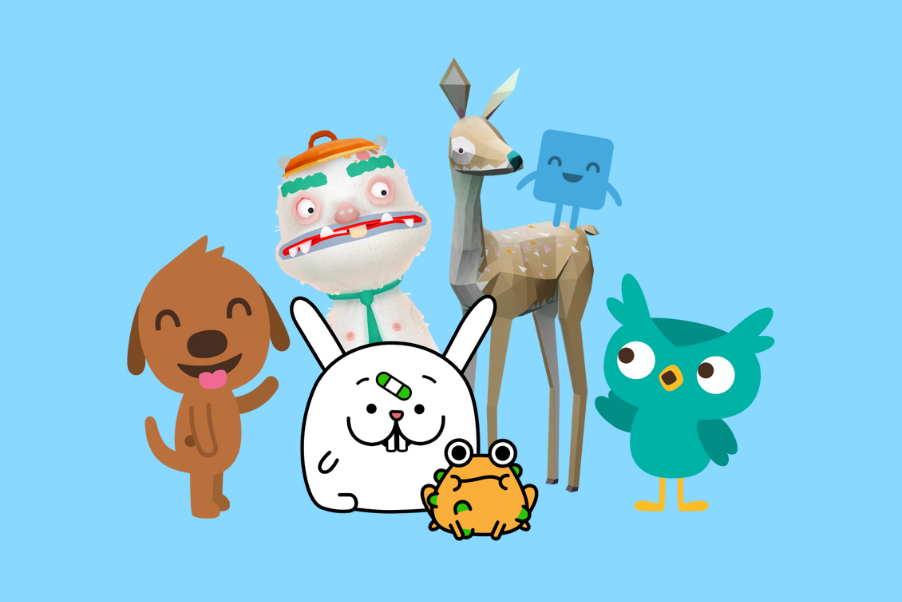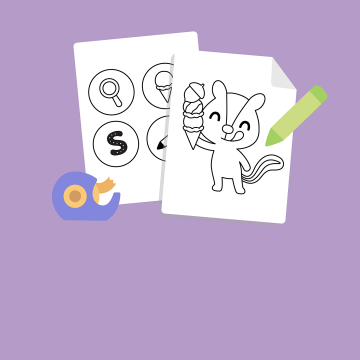- Reading for kids: The benefits of reading

There's nothing like a good book to take you to magical places, away from the daily hustle and bustle. It's so relaxing to cozy up, get under a blanket, and crack open a good book. No wonder so many of us like to read before bed...it's a perfect way to wind down after a busy day. Reading books together isn't just something fun to do...the benefits of reading for children are almost too many to list!
Why reading is important for kids
Reading opens up a whole new world where kids learn, imagine, get creative, and expand their knowledge. Little ones are naturally curious, and feeding this curiosity will help them become the best versions of themselves.
Both reading aloud to kids and the process of learning to read have many benefits. Books expand children's vocabulary and they're a great way to teach them about different topics, concepts, and cultures around the globe. Children's development areas are interrelated, which means that acquiring reading skills will in turn boost their overall cognitive development.
When do kids start reading?
Each child develops at their own pace, and it's the same with reading skills. Some start reading earlier than others. It's possible to draw a general timeline with milestones leading up to mastering reading skills. However, the time it takes to become comfortable with each skill depends on the child's individual developmental pace.
Before little ones can read, they first have to acquire some basic skills. The development of these skills begins when they're infants. Before they turn one, babies generally learn that sounds and gestures are used to communicate something. They learn the basics of communication, react when spoken to, and generally can direct their attention to an object or a person speaking. When they are read to, they respond by making sounds or interacting with the books and their pictures.
By the time they are three, kids can name their favorite books and identify the ones they like by the picture on the cover. You may notice your little one picking up a book and pretending to read, making up their own story along the way. Not only is this super cute to watch, but this step is also an important one, too! This indicates that your child can identify the named object. If they know a book really well, they may even finish your sentences when reading aloud.
Around the age of four, your kiddo may retell a familiar story or a story that has been read to them. They may start recognizing letters, write their own name, or notice rhyming words. It's around this time that they understand writing is different from drawing a picture. At preschool age, kids gain knowledge about sounds, syllables, letters, and words.
In kindergarten, kids usually start matching some spoken and written words and recognize familiar words in writing. They may also predict what will happen in a story, understanding the plot. In a story, they may be able to identify certain details like the main character, the location, or the event that's taking place. When asked, they can put the story's events in sequence.
Since they've had practice over the years identifying and learning sounds and words, kids can read familiar stories around the age of six or seven. When they face a word they aren't familiar with, they can often sound it out. It is also around this time that they can look at the drawings and understand the story. Sounding out words, understanding, and reading sentences can be considered reading.
How to improve kids' reading skills
Kids are curious and feeding their curiosity will result in significant developmental improvements. That's why it's important to support your little one's reading, and here are a few ways parents can help.
Visit the library
Having lots of books around at home is great, but providing your kid with great books to read doesn't have to break the bank! Libraries are amazing resources for you to browse through the shelves and let your kiddo take the lead with the selection process. Some libraries offer spaces where you can sit down and read along with other people, which will give your kid a chance to meet some book buddies their own age. They can recommend books to one another and expand their interests.
Offer lots of choices
Until your kiddo decides on what they'd like to read, try to include lots of books covering different topics. You don't have to rely only on books. Maybe your kiddo would like to read the comics in the newspaper or an article about new toys in a magazine. Offering lots to choose from will give your little one a chance to develop the ability to self-select what they would like to read.
Set a good example
Kids learn by observing those around them. They frequently imitate their parents and caregivers...monkey see, monkey do! So, if they see you pick up a book regularly, they may do the same. Try to include them in the conversation, too. Talk to them about what you've read recently, the characters in the book, or an overview of the plot.
Organize read-a-thons
Setting aside time to read together will give you an opportunity to bond with your kiddo and boost their reading skills. When you read to your child, you can choose something that is more advanced than their current skill level to help them learn new words. When they read to you, it's an opportunity to help them learn from mistakes and work through challenging words together. You can discuss the stories you're sharing by asking your kiddo to summarize what they have read. This will give you an idea of what skill level they're at with their reading and comprehension.

Reading apps for kids
Don't get us wrong, we're all for traditional printed books. However, you don't have to limit yourself to just books and other printed materials. There are a plethora of online resources and apps where you can easily access books and audiobooks for your kiddo. Also, online books can be beneficial for kids with sensory sensitivities or physical limitations, making reading more accessible.
One benefit of reading apps and platforms is that some are designed in a way to curate personalized recommendations for your kiddo. In addition to countless books, reading apps can make it easier for your kiddo to pick up the next book and stay engaged.
Reading games for kids
When in doubt, turn reading into a game! Here are a couple of fun and interactive reading games to boost your kiddo's skills.
Yes or no phonics
This is a great exercise to get your kiddo familiar with words and sounds and learn to recognize words while they're reading. It's a simple game that kids love, and it's just a matter of asking some yes or no questions about what they're reading. You can ask questions like, "Does the word begin with the letter A?" Or, "Does the word end in a consonant?" While reading, keep an eye out for words that you might want to work on with your kiddo. This game can be played with kids around the age of four.
Bingo!
What kid doesn't love a game of bingo? Plus, it's always super fun to watch your kiddo's reaction when they win. You'll need cues and words for this reading game, so it requires a bit of preparation. There are lots of that you can use, but it's easy to make your own at home, too. The goal of the game is to find words that rhyme with the word in the cue. The first player to get five in a row wins!
Reading tips and strategies for kids
Once your child gets more comfortable reading, there are some things you can try to turn reading into a habit!
Create connections
Making associations and connections with what your kiddo is reading to their everyday life can help them relate to the stories. For example, let's say you're reading your child a book about museums. You can remind them of a time you visited a museum and how much fun you had exploring the exhibits. This will also help them focus and stay engaged in what you're reading together.
Ask lots of questions
Ask open-ended questions about the story along the way. Encourage your little one to look for clues and they'll better comprehend the material you're reading. As a result, they'll become more curious about what will happen next in the story. Ask their opinion, or ask how they think a character might feel after a sequence of events. This will help them reflect on their feelings about the story while also fostering empathy.
Paint the picture
Adding another sense to the activity will take reading to another level! Create a picture of the scene you're reading in your head. Share with your kiddo what it looks like, how it makes you feel, and how it relates to the story. Now, ask your kiddo to do the same and compare. Ask them how the scene feels. Does the place they paint have any smells? Is it sunny? Visualizing will help make the story more vivid and memorable for your kiddo.
Kids' reading toys
You may find products that are designed specifically to help kids learn how to read. These range from carefully-curated educational reading toys, flashcards that target specific learning goals, to a learning game similar to the bingo game we mentioned earlier. Before jumping online to do some shopping, consider what your child likes to do in terms of reading activities and ensure what you're looking for aligns with what they're naturally interested in. Browsing the comments from other fellow parents can give you a sense of how other kids engaged in the toy, and whether they found it beneficial.
Reading programs for kids
Reading programs are designed based on children's individual reading levels and help them gain literacy skills in a systematic manner. To get your child enrolled in a program, you can consult with their teacher for a reading program that will suit their needs. You can also look into the many reading programs available online, each offering different methods of strengthening reading skills. Plus, some of these programs are free of charge. Before deciding on a reading program for your child, make sure that it's aligned with their skill level so they don't get discouraged if it's too advanced for them.
Reading programs not only instill a love of reading, but they'll also be helpful in boosting your child's future academic success. is an example of an online resource that can help improve your child's literacy skills. Be sure to browse what's available online and in your area, and see which reading program is right for your little one. Happy reading!


